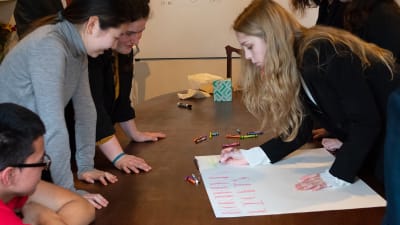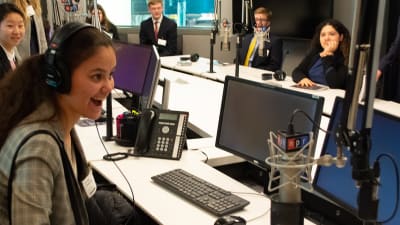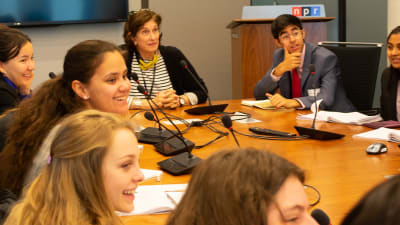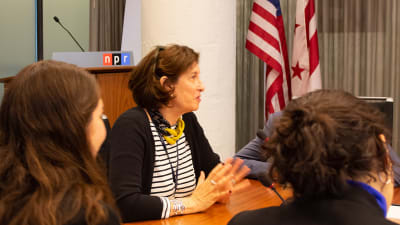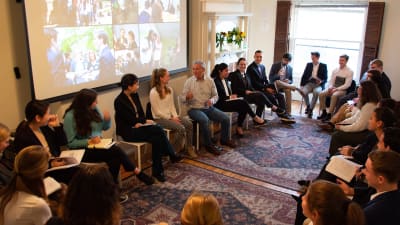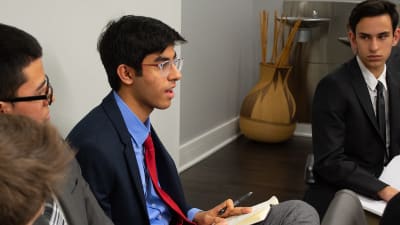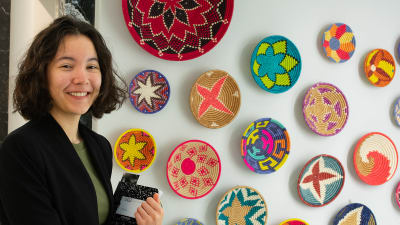The Rwandan Genocide and Its Legacy
Ghosts of Rwanda Night. It’s an SEGL rite-of-passage; an early turning point in every semester.
For over a decade, the powerful PBS Frontline documentary has challenged our students with classic leadership dilemmas: What is the right response to mass atrocities? Should American leaders always prize American interests above all? Is it ever worth risking American lives to help halt tragedy abroad? How do we prevent human rights abuses from ever occurring? Ghosts, and our second case study of the semester, poses these questions.
Spring 2020 Ghosts of Rwanda Night happened on our first Friday night. Students gathered in our Mike Michelson Commons to watch and then reflect on the film. Their reflections were emotional and thoughtful, and smaller conversations continued into the night.
The case study that follows includes meetings with two key players represented in the documentary and a trip to the Rwandan Embassy.
On Saturday morning, we met with Carl Wilkens, a former Adventist missionary who was the head of his church’s relief mission in Rwanda during the genocide. He was the only American to stay behind in 1994, and is most well-known for (among other acts) saving an entire orphanage from Interahamwe machetes. To SEGL graduates, he is a winner of our beloved “Golden Mug” award (2012), which our graduates give to the speaker who has made the biggest difference in their lives. (Carl is also an honorary SEGL teacher; three times he has co-led a group of our students to Rwanda. We’re planning a return with Wilkens this summer!)
Wilkens joined us in person in the Mike Michelson Commons of our residence. He is the founder of World Outside My Shoes, a genocide prevention NGO that travels the country speaking to schools, universities, and others. The students asked him a wide range of personal and political questions, and listened carefully as he addressed each one. He ended up staying for dinner afterward, too! One of the most valuable parts of an SEGL education is the opportunity to connect one’s personal values with one’s leadership decisions; Wilkens was particularly engaging on this topic.
On Monday we returned briefly to our media ethics case study with a visit to NPR’s national headquarters and a meeting with Mara Liasson. Liasson, a national correspondent with a storied history at NPR, tackled student questions on media bias, her decision to serve as a commentator for Fox News, and her take on current events (including the recent impeachment trial, which she covered in depth).
On Wednesday we walked two blocks from our Academic building to the Rwandan Embassy and met with Communications and Education Officer Elodie Shami. Shami shared information about Rwanda’s reconciliation attempts, the nation’s current challenges, and personal stories. The visit allowed students to hear from those affected most by the United States’ policy decisions, as well as their own perceptions of the nation’s progress since 1994.
That afternoon, the students took part in a favorite SEGL activity–the Leadership Styles exercise. With two questions (“Is your first instinct to observe or speak when in a group making a decision?” “When you make important decisions, do you decide with your head or your heart?”) the students divided themselves up into four classic leadership styles: Driver, Expressive, Analyst, and Supportive. Each group completed the same given task, but ended up with very different results; the ensuing conversation revealed, among other insights, the importance of having each style reflected in any decision making group (or, perhaps, in any decision making leader!).
Later this week we will hear from Ambassador George Moose, who was Assistant Secretary of State for African Affairs during the genocide. Moose (another Golden Mug honoree) helps students appreciate the bureaucratic hurdles that stymied attempts to intervene, as well as the reasons governments might choose against intervening in such conflicts. His diplomatic approach is also a useful contrast with Wilkens’ activist passion. Our world needs great leaders in both realms!
We will round out this case study with a Saturday Academy visit to the U.S. Holocaust Memorial Museum, where students will draw comparisons and distinctions with what many agree is the most notorious genocide in history.
(Another longtime SEGL guest speaker featured in Ghosts is current UPS Vice President for Global Affairs Laura Lane. Although Lane no longer speaks publicly about her time in Rwanda, she gave a TED talk in 2015 that is very similar to the story she has told hundreds of SEGL graduates. You can view that talk here.)
Last week students also participated in the first edition of our Books and Basketball community service project (more on that in a future post), their first student-led School Meeting, and a special watching of the (confusing!) Iowa Caucus results.
Next up: the Israeli-Palestinian Conflict, in the news these days thanks to President Trump’s new and controversial peace plan.

